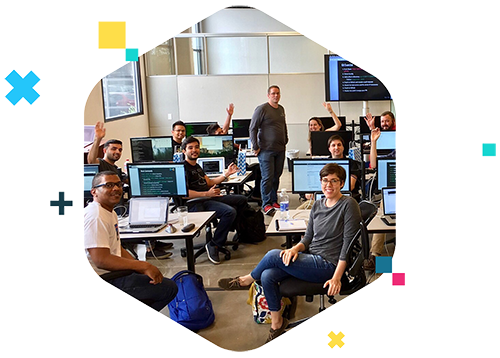Reasons to Choose DigitalCrafts Bootcamp
It's impossible to be unprepared once the course is over due to the abundance of resources available, including assistance with resumes, cover letters, portfolios, interview preparation, consistently updated job boards, and not to mention the personalized 1-on-1 sessions that cater to individual needs. Cody S., Cybersecurity, 2023
We build the web. So can you.
DigitalCrafts ranks among the best online coding bootcamps in 2024 by CourseReport with online programs in Software Development and Cybersecurity.
We offer students a quality experience with proven techniques.
- No experience needed to start
- Free Introductory Classes available
- Program completion in as little as 15 weeks
- Instructors with industry experience
- 24/7 tutoring available through Tutor.com with live tutors
- Scholarships and Grants available for those who qualify
- Reasonably priced tuition and flexible payment options
- Complimentary AI Training Course available when you complete a DigitalCrafts Software Development or Cybersecurity certificate program


Instructor-Led Programs by Trained Professionals
Receive hands-on and guided learning from trained professionals with real-world experience and a passion for teaching. Our online programs allow students to work with an instructor and complete their assignments within the guidelines of the course deadlines. Our program options allow for networking and engagement with fellow students and regular access to the instructor.

An Industry-Aligned Curriculum Built for Beginners
Crafted with beginners in mind, students can expect to work on industry-relevant exercises, tools, and projects that reflect skills utilized in the workplace. Each program’s curriculum is adapted to the market’s ever-changing needs to ensure that students engage and study the commonly needed skills among today’s employers.

An Active Community of Support
The DigitalCrafts community is an enthusiastic group of students, staff, and alumni, so support is always a quick message, phone call, or video chat away. Many students remain active in our community after graduation, through our alumni support.

Continuous Student Support
Student advisors schedule weekly individual meetings with students during the first few weeks of their first course to support students as they transition back into an educational environment. These meetings consist of time management assistance and reviewing courses and grades. These meeting cadences will shift depending on how the student is performing overall.
Career Services and Support
At DigitalCrafts, we support our students as they prepare to launch a potential new career path in tech. Our instructors and our Student Success Team provide students with feedback and insight in a variety of ways during and beyond their DigitalCrafts journey.
Students at DigitalCrafts have access to several pathways of support including the following:
- Resume Feedback and Guidance: Students can receive feedback and guidance on how to develop a professional resume, cover letters, and emails to potential employers
- Portfolio Support: Students will have assistance creating an online presence and portfolios that could be visible to potential hiring managers
- Interview Skills: Students will have the opportunity to participate in mock interviews and discuss best practices in preparation for different types of interviews they may encounter
- Continued Support: After they graduate, students have the option to continue in the DigitalCrafts community and take advantage of career support services
- Monthly Career Talks: Student advising has a live career talk monthly where they will cover preparing LinkedIn profiles, job search, and professional workplace etiquette. These are held via Zoom and are designed to provide opportunities for students to interact with student advising and other students.
DigitalCrafts cannot guarantee employment, salary, or career advancement.
Bringing Diversity to Tech
New and innovative ideas come from different viewpoints, and diverse teams can help build better and more inclusive products. As an educational institution, we have the privilege and the responsibility to help change the face of tech. Our scholarships and educational alliances are designed to help underrepresented and diverse students access education and pursue a potential career path in tech-related fields.
View Scholarships
